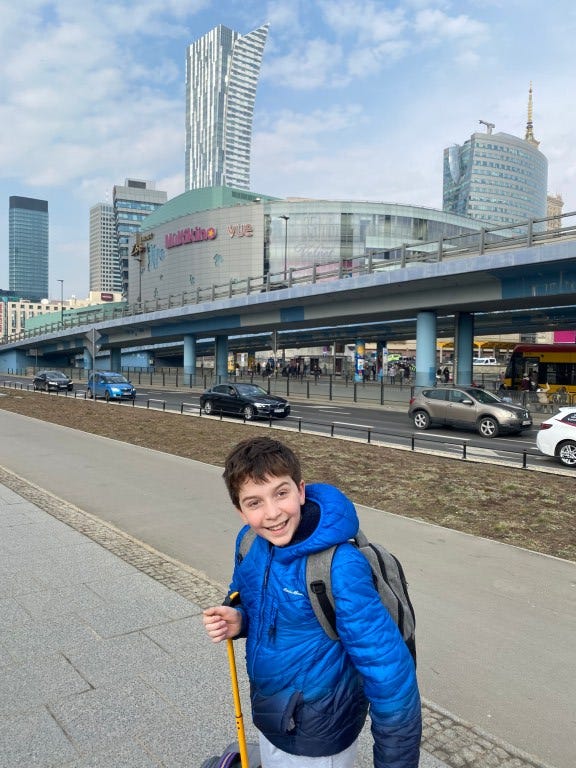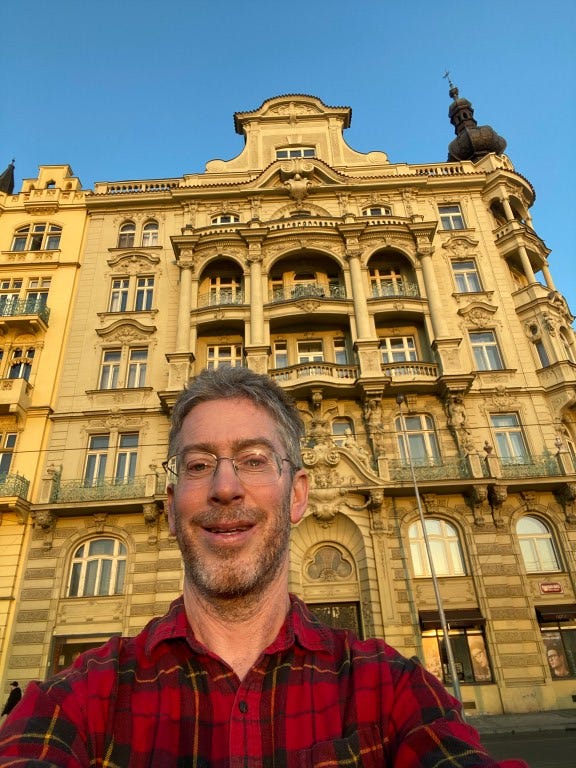While this was an historic time to visit Eastern Europe, I would still be bursting with commentary had the region remained at peace. To repeat, my son and I traveled through Poland (Krakow, Wroclaw, Warsaw), Hungary (Budapest), Slovakia (Bratislava), and Czechia (Brno and Prague). It was my first time in each of these countries. I mostly spoke about Open Borders; translations were available in all four countries. Yet I also lectured on democracy and education - and did interviews on parenting, natalism, the Russia-Ukraine war, and more. I was sponsored by the Instytut Misesa in Poland, Helpers Hungary in Hungary, INESS in Slovakia, Students for Liberty CZ in Brno, and the Liberální Institut in Prague. Since I've already covered the Ukrainian refugee crisis, here are my non-Ukrainian thoughts:
1. My son and I arrived in Eastern Europe a third of a century after the collapse of Communism. All four countries used to be totalitarian socialist hellholes. Now they all look great: Rich, vibrant, worldly. Despite the post-Communist belly-aching and foot-dragging, massive privatization, deregulation, and globalization worked their promised magic.
2. While the gain in per-capita GDP has been high, this grossly understates the magnitude of the economic progress. Why? Because, due to the low quality and severe shortages of goods, Communism exhibited massive CPI bias. Since true prices under Communism were much higher than official prices, initial poverty was far more severe than standard statistics would have you believe. Poland, Hungary, Czechia, and Slovakia are all economic miracles, veritable Wirtschaftswunder, and we should all give thanks.
3. Starting in 1989, Poland famously took the path of "shock therapy" - privatizing and deregulating hastily, before populist resistance could derail liberalization. Jeffrey Sachs famously pushed this prescription - then endured years of derision for his efforts. Decades later, Sachs remains proud of his record: "All in all, I would not only stand by these ideas, but also stand by the results. Poland actually transformed." Looking at Poland, I have to agree.
4. In 2013, Sachs insisted, "I’m not a free-market libertarian by a million miles." Why, then, has he been been the target of so much leftist and populist hatred? How did he become a symbol of "neoliberalism"? The answer, as I've explained before, is that pragmatic economists like Sachs and free-market economists like me agree upon many truisms. Truisms like, "Communism is terrible and we should zoom away from it." Staunch leftists and populists are so outraged by these truisms that they denounce anyone who accepts them as "neoliberals." Which unfairly - though amusingly - hands earnest free-market economists a monopoly on common sense.
5. I arrived two weeks before yesterday’s Hungarian election. The main opposition parties banded together to beat Victor Orban, but betting markets predicted they would fail. After I saw the opposition propaganda, my reaction was: "No wonder." You'd think Orban's enemies would seize on this golden opportunity to denounce the Great Illiberal Democrat as the Hungarian Putin; or better yet, to mock him as Putin's puppet, pet, lover, or stooge. Instead, the opposition posters were boring portraits with banal slogans. (Though in my neighborhood, a few opposition signs were fraternally vandalized to add "Orban=Putin" messages).

6. The United for Hungary opposition coalition includes a cacophony of ideologies: everyone from reformed fascists to socialists to greens. If they actually gained power, what could they even agree to do? As far as I can tell, not a single party in the coalition actually stands for the free-market, cosmopolitan policies that turned Hungary from a wretched socialist despotism into a decent place to live. Verily, demagogues rule the world.
7. Decades ago, Rothbard mocked the creation of Czechoslovakia. Quoting one of his lectures from memory: "There's Czechs; there's Slovaks; there ain't no such thing as a Czecho-Slovak!" The Czechs and Slovaks I met, however, said otherwise. The languages are mutually intelligible to everyone except small children, which means that both Czechs and Slovaks can easily read the Czech translation of Open Borders.
8. I'm big in Slovakia. Unclear why, but over a hundred people showed up to hear The Case Against Education for INEES. I also shot episode #100 of their podcast.
9. Prague was beautiful, with almost every downtown building painstakingly crafted and decorated. I oppose historic preservation laws, but at least in Prague you can grasp their appeal. In all the other cities, especially Budapest, you see vast vistas of mediocre construction. And if you're like me, you also see the amazing architecture that would arise if government stopped fighting the future.
10. In Prague, I received the Liberální Institut's Annual Prize. Former Prime Minister of Czechia Mirek Topolánek introduced me - and declared himself a big fan of my Myth of the Rational Voter (which has been translated into both Polish and Czech).
11. Throughout my journey, I kept remembering Alfred-Maurice De Zayas' A Terrible Revenge: The Ethnic Cleansing of the East European Germans. De Zayas claims that ethnic cleansing of Germans in the aftermath of World War II caused over two million deaths. That's probably too high, but the lowest estimates of the body count are still half a million. Awareness of this "terrible revenge" was most vivid for me in Wroclaw, formerly Breslau, where virtually the entire German population was forcibly expelled after the war ended. Sure, if you believe in collective guilt, you can easily scoff that "the Germans had in coming." But no one should believe in collective guilt because it is absurd.








As David Friedman has described well in "Legal Systems Very Different from Ours", collective guilt is a thing in many societies. It recurs because if many will be punished for the crimes of one, the many will police each other to prevent crimes.
It is, of course, completely incompatible with any version of liberalism.
Hate to be that guy, but those are Central European countries. Eastern Europe is basically Russia, plus the Ukraine, Belarus, maybe Moldova etc. The countries you visited are quite distinct from Eastern Europe, both geographically and culturally.